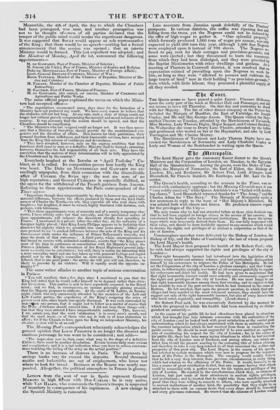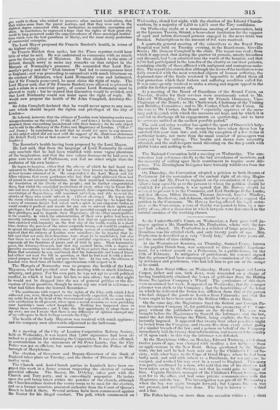Ebe Ailttrbpolis.
The Lord Mayor gave the customary Easter dinner to the Queen's Ministers and the Corporation of London, on Monday, in the Egyptian Hall of the Mansion house. Among the guests, were the Duke of Cam. bridge, the Marquis of Normanby, the Earl of Eldon, the Bishops of London, Ely, and Rochester Sir Robert Peel, Lord Abinger, Lord Bloomfield, Sir Francis Burdett, Mr. Easthope, and Mr. Law the Re- corder.
The Queen's health, according to the account in the Times, was re• ceived with enthusiastic applause ; but the Morning Chronicle says it was " very coldly received," while Queen Adelaide's was "hailed with deafen. ing cheers.'" Lord Bloomfield returned thanks for " The Army," and Sir Charles Adam for "The Navy." The Marquis of Normanby spoke a few sentences in reply to the toast of "Her Majesty's Ministers. He was saluted both with cheers and hisses. He professed sincere regard for the privileges of the City—
Time only reason why he had not attended before at these civic festivals was, that lie hail been engaged in foreign clinics in the service of his country. He entertained the highest value for municipal institutions. He knew the advan- tages which were necessarily derived from them. He wasTully impressed with their value, and should be most decidedly opposed to any measure which tended to destroy the rights acid privileges of so ancient a corporation as that of the city of London.
Commonplace speeches were delivered by the Bishop of London, the Bishop of Ely, and the Duke of Cambridge ; the last of whom proposed the Lord Mayor's health.
The Lord Mayor then proposed the health of Sir Robert Peel ; who, he said, had always supported the rights and privileges of the city of London— That right honourable baronet had introduced into the legislation of his country many useful and salutary reforms, and had particularly distinguished himself by his endeavours to improve the Police of this Metropolis, lie had set the Corporation of the city of London a glorious example ; and that Corps- rationk in following his example, was bound on all occasions gratefully to support his endeavours and drink his health. He had been given to understand that that right honourable baronet would most ardently and strenuously support all the rights and privileges of the city of London. He was most happy to see that right honourable baronet among them that evening, and to express to bin how sensible he was of the past services which he had rendered to the cause of Reform. He felt satisfied, that upon the present question, in which their pri- vileges had been assailed in the most vehement manner, they should have the support not only of the right honourable baronet, but also of every honest mu who loved order, regularity, and tranquillity. (Loud cheers.) Sir Robert Peel said, he was excessively flattered by the manner in which the proposal to drink his health had been received by so distin- guished an assembly— him the course of his public life he had oftentimes been placed in situating which had brought him into intimate connexion with the authorities of the city of London ; and he looked back with great satisfaction at the cordial good understanding which he had always maintained with those in authority, and at the constant cooperation which he had received from them in conducting the public service. Ile should he most ungrateful if he ever omitted an opportu- nity of mentioniog his respect for the city of London ; for, in the course of his public life, there had been many trying situations in which he had received from the city of London acts of kindness' and among others, one which en- titled him to call the present meeting by the endearing title of fellow eitizenh and therefore to take a very deep interest in all that concerned the welfare and prosperity of this great city. The Lord Mayor, in the course of his speech, had referred to certain measures which were now in progress for the improve- ment of the Police in the Metropolis. The company would readily believe that he felt a very deep interest, from previous circumstances, in every thing which had relation to the efficiency of the Police. It would, however, be to him a source of great satisfaction to find, that any measure having that object could be reconciled with a perfect respect for the rights and privileges of the city of London. He rejoiced in the manifestations which they, as citizens of London, had just made of their attachment to ancient rights, privileges, and institutions ; and Ile trusted that he might take these manifestations as a proof that they were willing to concede to others, who were equally attached to ancient institutions of another kind, the possibility that they ought be so attached to them with an earnest desire that every abuse should be remedied and every grievance redressed. He trusted that the citizens of London would give credit to those who wished to preserve other ancient institutions, that their wishes arose from the purest motives, and that they were not in the a
liAtest degree connected with any inclination to maintain corruption and ntive. In conclusion, he expressed a hope that the rights of their great city would be long preserved under the superintendence of those municipal institu- were the best guardians of liberty, and the most steady protectors flans which of commercial enterprise. The Lord Mayor proposed Sir Francis Burdett's health, in terms of the highest eulogy.
Sir Francis Burdett then spoke, but the Times reporter could hear little of what he said. He was understood to commence with au attack upon the foreign policy of Ministers. He then alluded to the state of Ireland, though sorry to make any remarks on that subject in the Marquis of Normanby's presence. He contended that Lord Nor- raanby's poli3y and the Irish interest " had led to consequences fatal to England; and was proceeding to animadvert with much bitterness ou the conduct of Ministers, when Lord Normanby rose and intimated, that if Sir Francis persevered, he must claim the right of reply. The Lord Mayor said, that if Sir Francis Burdett;were allowed to proceed in such a strain in a convivial party, of course Lord Normanby must be allowed to reply ; but he trusted that discussion would be avoided, and that Lord Normanby would not insist upon the right of reply. Ile would now propose the health of Sir John Campbell, Attorney-Ge- neral. Sir John Campbell declared that he would never agree to any mea- sure which should impair the rights and privileges of the city of London— He believed, however, that the citizens of London were labouring under some misapprehension on the subject. (4‘ Oh, oh !" and hisses.) In the measure now proposed, there was nothing inconsistent with their honour ; for its only object was to add to the efficiency of the Police and Magistracy of London. ("Hear !" and hisses.) In conclusion, he said that he would not agree to any measure on this subject which did not meet with the support of the illustrious statesman (Sir Robert Peel) who at that moment was sitting on his left. (Cheers and laughter.)
The Recorder's health having been proposed by the Lord Mayor,
Mr. Law said, that from the language of Lord Normanby he could only conclude that he had been troubled with smite vague phantoms of the imagination, and that the two vulgar documents he had seen in print were not acts of Parliament, and had no other origin than the confusion of his own brain— Ile began to imagine, either that the scheme of which he had heard was unknown to Ministers, or that, it' it had ever hen known to them, they hail at least become ashamed of it. He congratulated the Lord Mayor and his fellow citizens, that every geutleman who hail that night addressed them had enjoined in one commou declaration, that their municipal institutions were the foundation of the liberty of the people;_ and he further congratulated them that whilst the muoiemal institntions of every other city in Great Bri- tain Lad been altered, and, it might be, improved, their corporation, the ancient constitution of Saxon times, still remained Unbroken, and able to resist the attacks of those who would subvert it. ( Greiet cheering.) He hopd that the storm which recently raged around them was now gone by : he hoped that a sense of commou danger had raised such a spirit in our corporate bodies as would render it 'perilous and unsafe for any one to subvert their rights and privileges; for it any Government should. he powerful enough VI set at nought their privileges, and to degrade their Magistracy, all the other municipalities in the country, bo which the administration of their own pollee had been 60 recently intrusted, would have reason to fear that an aggression which had been exercised with impunity 011 the first city of the world, would, in a short time, destroy the powers of the minor corporate towns, and would be employed to spread throughout the country one uniform system), of centralization. Ile rejoiced that the citizens of London were mistaken ; lhr he finicied that he had read that not only their functions were about to be annihilated, but also that there was to be created a tribmial of you experience, which was to supersede all the functions of jurors and of trial by jury. Their honourable guest, the Attorney-General, had that day assuredl them, with a degree of siucerity amounting to solemnity, that on MI these points they were mistaken. From that assurance he was convinced, that his honourable and learned friend had either not read the bill in question, or that he had read it with a deter- mined purpose that it should not pass into law. At any rate, the citizens of London were freed from all further apprehensions with respect to it.
The Marquis of Normanby rose to propose the health of the Lady Mayoress, who had presided over the meeting with so Much kindness, urbanity, and grace. For his own part, he was not apt to avoid political conflict, in which it had been his fate to mix often ; but on that night he would not be dragged into the sea of general politics or the dis- cussion of local questions, though he must say one word in reference to what had fallen front the learned Recorder—
Time sentiments with respect to the rights of the City, with which 1 first addressed you, were, though much more imperfectly expressed, the same which my noble friend at the head of the Government expressed, with so much appa- rent satisfaction to all present, when upon a recent occasion we were partaking your Lordship's more select hospitality. Nothing has happened since to change these sentiments ; atul I take the first opportunity to adopt them as my own ; nor ant I aware that there is any difference of opinion amongst any of my colleagues in their feelings towards the City."
The health of the Lady Mayoress was received with much applause ; and the company soon afterwards adjourned to the ball-room.























 Previous page
Previous page